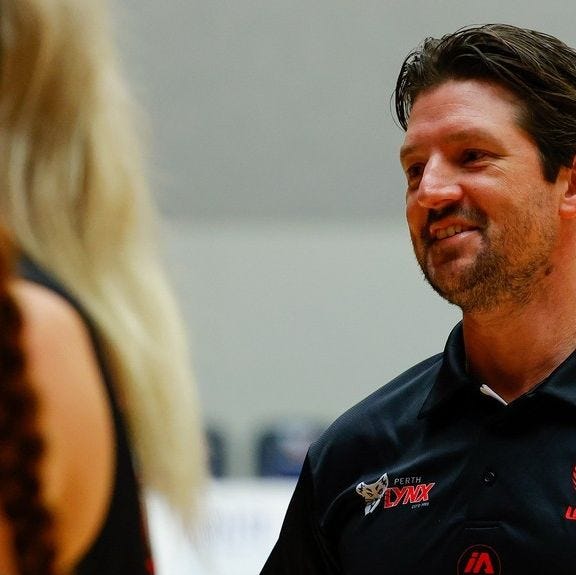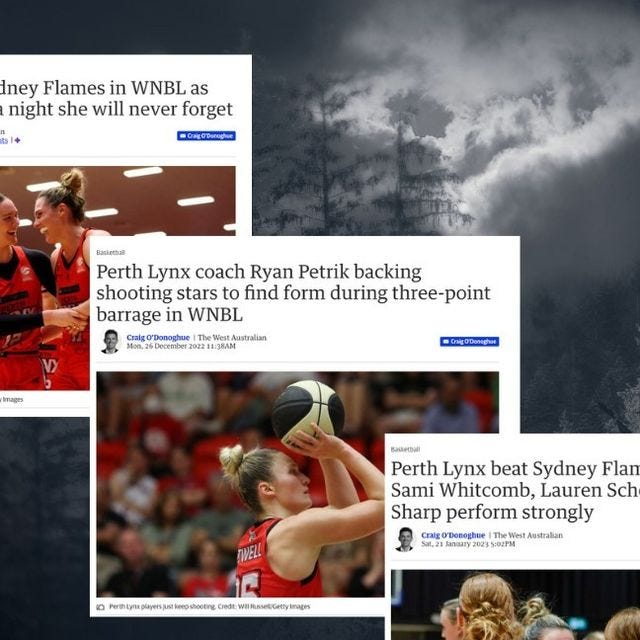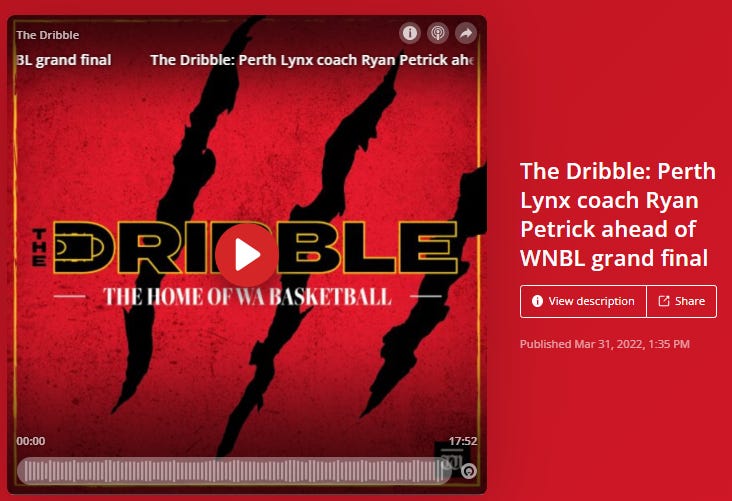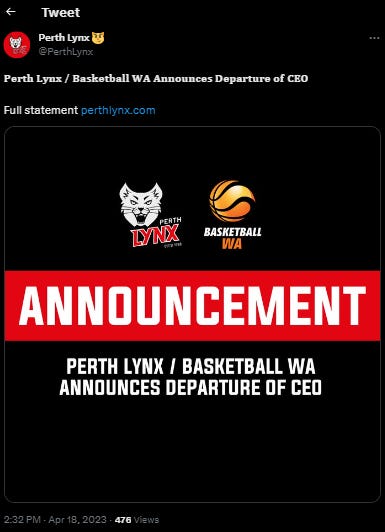The pressure of being a head coach: How Ryan Petrik manages his mental health
Mental health for players is now often talked about, but what about the coaches?
Credit: Jenny Evans / Getty Images
The topic of mental health is often raised around players of Australian leagues, but some of the most important members of our basketball community are often missed.
Plenty has changed even in the last decade of the game, and while the focus has been recently on our players — such as Anneli Maley — often overlooked is the mental health of coaches.
An NBA example of this is Indiana Pacers assistant coach Bill Bayno. Bayno, as reported by Adrian Wojnarowski, quit basketball due to mental health related issues — privately describing a need to step away from the pressures and workload of the NBA grind amid the pandemic.
Australian coaches are not immune, and many are struggling. According to an AIS mental health study in 2020, it is reported that 40 percent of coaches are quitting or are struggling with life involving basketball because of issues surrounding mental health. That is no small number.
The pressure for coaches to deliver has never been greater — whether it be at the professional level, or right down through to grassroots basketball. Right or wrong, coaches are often assessed by the on-court success of their teams, judged by wins and losses. If the wins are not flowing, and the team is not playing well or improving, the pressure mounts and it can all become just too much.
Coaching can be a thankless task, just ask Brian Goorjian. The Boomers’ 2023 FIBA Basketball World Cup campaign came to a premature end despite boasting an NBA-talent laden roster, but conversely, it can be highly rewarding too — having broken through to lead the Boomers to bronze in Tokyo.
It's apparent that there are plenty within the coaching ranks that have been able to come up with a winning formula, a way to balance the good with the bad. Those who have found their happy place with coaching, and developed coping mechanisms on how to tolerate the pressure. How to manage the pressure, the expectations of fans, players, the front office, and sometimes, the lack of on-court success, is all part and parcel of being a coach. But it can and does take a toll, and often nobody knows just how much.
I often chat with NBL1 head coaches after their games, and many of our experienced ones have learned to deal with their fan bases. When I ask them about whether they feel the external pressure from their fan bases, they shrug or share colloquialisms like ‘water off a duck’s back’.
I suspect for many however, there’s more to it than just ignoring the comments and generic responses to questions. Ryan Petrik of the NBL1 West Rockingham Flames Men and WNBL Perth Lynx unlocks the keys to handling not only one senior coaching job but two.
Ten years of pressure
Ryan Petrik has been coaching since 2005. He began working as an assistant for the Rockingham Flames under the guidance of coach Mark Utley, when in 2009, they promoted him to the position of head coach for the women’s team. He would eventually become the lead assistant for head coach Andy Stewart from 2015 to 2020 before the pandemic hit. He led the men's team during the NBL1 rebrand in WA and also coached Perth Lynx in WNBL.
In essence, Petrik has not had a winter off since 2004. The 2022 WNBL Coach of the Year had to be away from his family due to the Lynx basing themselves in Ballarat during the strict COVID-19 restrictions enforced in Western Australia at the time. The emotional toll on coaches and individuals like Petrik can be profound.
“I’ve shed a couple of tears, watching film back late at night. Jada’s about to start walking, I’m probably going to miss her first steps,” shared Petrik in speaking with Megan Hustwaite back in January 2022. “You try not to think about it too much because you break out in tears.”
Coaching at clubs hasn’t changed from a mental point of view; many of the processes and execution of basketball in terms of personnel remains unchanged. It includes dealing with and managing external noise, pressure from all different stakeholders, and personal circumstances such as those shared by Petrik. Accessibility of the sport via platforms has changed the game literally, with many coaches opting to stay off social media to avoid any additional and unwanted pressure.
Petrik fully understands the difference in the intensity of the pressure between NBL1 and WNBL level. It’s often what people do not see behind-the-scenes, the amount of work and effort put in by coaches and administrators, that goes unacknowledged. Those who are not involved at club level, are often not aware of just how much is actually involved. Any fan, critique and commentator is able to quickly and easily post their thoughts on social media, and often done without any understanding or awareness, and it is this that can be damaged to the mental health of coaches according to Petrik.
“The public only sees 10-20 percent on the floor each weekend of what goes on behind the scenes at all levels. We’re making the best choices we can with the entirety of the information. Whereas people on the outside that are the experts, the armchair expert, so to speak, might know tentative names and facts and then form their solution based on that saying, ‘should’ve done this’ or ‘done that.’
“But what they don’t know is that we couldn’t do that because this player had a bung knee, or something going on off-court, and that’s why they were rested that night and couldn’t use them as normal for example - but I couldn’t tell you that in public.
“Hence, you protect your players from the inside. That’s the main reason you don’t always pay any attention to the outside noise.”
This isn’t the first time Petrik has touched on this subject in an interview. Petrik also spoke to the Dribble Podcast for Perth Now with journalist Craig O’Donoghue leading up to the 2022 WNBL finals. He summed up the distinctive challenges he faced through the restrictions imposed on his Lynx team from their state and country.
“If you can get through this, you can get through any year. It’s just been insane,” Petrik said.
“People from the outside think it’s been hard. It’s been 30 times harder.”
“You’ve kind of had to wear eight million different hats and find a way to somehow play a game of basketball.”
Petrik appeared quite relaxed when discussing the issues with me; it feels like perhaps he’s already been taken to the edge to be tested mentally as a coach. Another quote from the same podcast might highlight another mental health issue affecting our league’s coaches.
“It was one minute of a podcast…”
To promote the game and support factual storytelling, the coach-media relationship is crucial. Petrik and the Lynx have a great relationship with Craig O’Donoghue, a top basketball journalist in Western Australia. The media can help promote basketball, it’s athletes, coaches and everyone else involved, but they can also be just as harmful.
After appearing on an episode of Dribble Podcast, Petrik covered his thoughts on the COVID-related restrictions back in 2022, and then only a single line from the podcast was reported by the mass media, and out of context.
“I’d done a podcast here in WA with Craig and shared about my thoughts around the COVID situation – but I’d only found out that a single quote of mine had been lifted from that.
“It was an 18 or 19-minute podcast and there was one line taken from that and within like 90 minutes that turned into an article somewhere and then all of Canberra went crazy about it.
“I started getting phone calls to read it, which as I stated before, I normally don’t concern myself with what’s posted on social media or in the media, but had to back up and say to many people sorry, what did I say? Have you listened to the podcast? Have you listened to the quote in context, or have you listened to the one line, which I admit on its own didn't read well. But when you zip read then put the surrounding 19 minutes around it you can see what I was trying to get at.”
Listening to the podcast clarifies the article was about the Lynx players' messaging for self-management and wise decision-making before the 2022 WNBL finals. However, plenty of individuals got caught up in the crossfire.
Several Canberra players and the public took to social media to post about their examples of other people highlighting the flaunting of restriction conditions.
“It’s a complete attack on my character,” Abby Cubillo stated in a responding article.
It is incidents like this that result in coaches and players providing standard, vague responses, as it affects people’s mental wellbeing. With the mass media after stories and increasing using clickbait headlines, the quotes provided are often the impetus behind them, a situation where Petrik believes sports journalists should take more care with. For more transparency, context of the quotes provided should be included in the analysis and reporting, going a long way to ensuring characters and coaches feel like that they can be more open and honest in interviews and press conferences.
“People can grab a sentence out of a paragraph when a coach is trying to give clear and concise answers – but it’s become more important just to be very vague. I hate it. I try and be pretty blunt and direct with my answers, but also having done that and seeing how that can go against you (as above), I understand why the best of the best does it.”
To avoid negative consequences, coaches and players are increasingly keep their responses standard and plain, often lacking in detail and personality.
If we want more characters and interesting people in the game, we need to be less hypercritical of what they say, and publish what they say. While it may draw clicks and views; has the true cost to the individuals and their mental health status been considered?
If we are serious about the mental health of our athletes and sports, then the media has a responsibility to be mindful of who they analyse and report on. As Petrik stated in 2023, people can become outraged quickly and we need to be aware of that.
The media no doubt plays its role in how outraged our public becomes.
“There’s no one else to blame but myself.”
The COVID-19 pandemic enabled our athletes and coaches to incorporate new routines during the restrictions. Petrik developed a method to handle the stress of coaching basketball for a full 12-month schedule, before, during, and after the pandemic.
As a head coach, he also manages a 24-hour gym throughout the year. During the pandemic, when his job as a non-essential worked was shut down, he took up golf as it was available nearby.
Petrik and other coaches use golf and other hobbies to take a break from basketball - a method often used by successful leaders. He started playing with other basketball players following an invitation by Keegan Crawford.
“I hadn’t played in ages, but for whatever reason the golf course near where I lived stayed open. So my routine became doing online coaching clinics in the morning and once I was done, I went and played golf in the afternoon to relax. I was playing up to four, five, six times a week as at that time there was nothing for me to do.”
“[Playing golf] allows me to turn my phone off and not blame anyone but yourself for how you play – like when it’s basketball – you might say the ref made a bad call, or the score bench got the possession wrong, or your team didn’t read the scout, or someone shot the wrong shot whereas in golf – there’s no one else to blame but myself…”
Golfing has helped Petrik see the bigger picture and manage his mental health better.
Basketball players are finding ways to relax and control their activities, such as writing a journal, going to the gym, or spending time at the beach. Coaches are also taking time off during non-match days to reset themselves.
The experience of uncertainty
Petrik is familiar with the ownership situation at Perth Lynx, now bolstered with the support of a partnership with the SEN owned Perth Wildcats, and more recently with Rio Tinto. He explained that he had not let the uncertainty of club ownership affect his mental health.
“I think the general reaction for most people had been like yours. And mine, for whatever reason, had just been the exact opposite.
“I’ve been through it twice when the Wildcats took over from Basketball WA, then went through it again when the Wildcats handed it back to them. And now, going through it for a third time to whoever the new owner was going to be. They’ve been through it three times in eight or nine years.”
For what Petrik has been through, it’s no shock; he’s not worried. Despite the Lynx seeking new ownership, he has continued preparing for the season ahead as if nothing has changed - it’s business as usual. He continues to carry on despite knowing that he can't control the situation and that the unknown is uncontrollable. He’s learned this from two head coaches throughout his career: Mark Utley and Andy Stewart.
“Andy always said to everyone you are your life’s experiences - I’ve heard that one before, and if you apply that to certain things, it makes so much sense why a player reacts a certain way. I use it all the time.
“Mark used to emphasise that being a head coach is not just about Xs and Os, but also about managing off-court factors that are beyond your control. This made me realise we build some teams to win immediately, while others require nurturing and development.
“In this time of uncertainty with the Lynx and from my experiences, that’s what I’m applying as I build a roster for WNBL24.”






